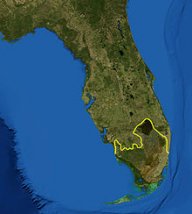Current Environmental Issues in Florida
Lakes, wetlands and rivers bring life to Florida's most important natural features: the Everglades, Lake Okeechobee, and the state's mangrove forests and beaches.
Florida’s waters are critically important to the state’s economic well-being and its residents’ quality of life. But water quality across the state has been declining for decades, due to unchecked agricultural pollution, rapid development, and cattle operations. Many of the state’s freshwater springs, rivers, and lakes are now stagnant and choked with algae.
For decades, the Florida regional office has worked to strengthen regulations to clean up Florida’s waterways and ensure that government and industry are held accountable and the public is informed and engaged.
We have a vision of Florida waters restored to the astounding natural resource they once were. We're working for a future where the state’s aquatic ecosystems function naturally and healthily, support wildlife populations, help to meet the state’s drinking water needs, and offer safe and beautiful places for recreational activities.
With locations in Miami and Tallahassee, the Florida regional office's work includes:
Stopping the poisoning of waterways with phosphorus and nitrogen pollution
The Florida office is dedicated to curbing the widespread contamination of Florida waters by sewage, fertilizer, and manure. This pollution, which contains high levels of phosphorus and nitrogen that skew the natural balance of aquatic ecosystems, results in toxic algae outbreaks that cover waterways with green slime and cause rashes, breathing problems, stomach disorders, and even death. These outbreaks kill dolphins, manatees, birds, and fish, and are linked to Florida’s record number of manatee deaths in 2013.
A complex litigation campaign by Earthjustice attorneys worked to compel state and federal agencies to comply with the Clean Water Act and set numeric limits for phosphorus and nitrogen pollution. Victories include:
- In 2010, our work forced the U.S. Environmental Protection Agency to finalize the first-ever numeric limits on phosphorus and nitrogen in Florida’s lakes, rivers, and streams.
- In 2012, pursuant to our federal consent decree, the agency proposed similar rules for estuarine and coastal waters. The consent decree required that these protections apply to 85 percent of Florida’s waters.
Everglades ecosystem protection and restoration
Since 1988, Earthjustice has represented a coalition of environmental groups in a federal case to clean up devastating agricultural pollution in the Everglades. We negotiated a settlement agreement in 1992 that required significant Everglades restoration measures and court-enforced pollution limits.
Since then we have filed lawsuits to keep pollution from agricultural operations—including industrial sugar-growing complexes—out of the Everglades. We have persevered when political winds changed over time, suing to make sure that federal and state governments kept their commitments. Our successes include:
- Securing effective pollution limits and the building of treatment marshes to filter runoff before it gets into the Everglades
Protecting Lake Okeechobee
Florida’s largest freshwater lake and a key feature of the Everglades ecosystem, Lake Okeechobee has suffered for years from high levels of phosphorus and nitrogen pollution from agricultural and urban runoff. Earthjustice won a landmark victory when we secured a court ruling that the long-running practice of back-pumping contaminated farm and urban drainage water into Lake Okeechobee is illegal. In response to that decision, which was a devastating loss for the sugar industry, EPA issued a rule that exempted water transfers from Clean Water Act permitting requirements. The rule, aimed specifically at undermining our federal court victory, is supported neither by a reasonable interpretation of the law nor by scientific analysis. The controversial rule set off a legal firestorm.
Reopening the Ocklawaha River to sturgeon and manatees
The Rodman Dam on the Ocklawaha River in the Ocala National Forest is a useless relic of the Cross-Florida Barge Canal project that was abandoned long ago. It blocks access to important Ocklawaha River habitat for endangered shortnose sturgeon, Southern Atlantic sturgeon, and manatees.
Preserving public access to Fisheating Creek
Earthjustice has represented conservationists in more than two decades of legal disputes with agribusiness giant Lykes Brothers, Inc. over the public’s right to fish and boat on one of South Florida’s wildest waterways, Fisheating Creek in Glades County. The creek is a major tributary of Lake Okeechobee, and is a wild and scenic waterway which courses through prairie, cypress swamps and marshes. The fight to maintain the public’s right to use Fisheating Creek began in 1989, when Lykes felled cypress trees across the creek’s navigation channel and posted “No Trespassing” signs, claiming that the creek was not navigable.





